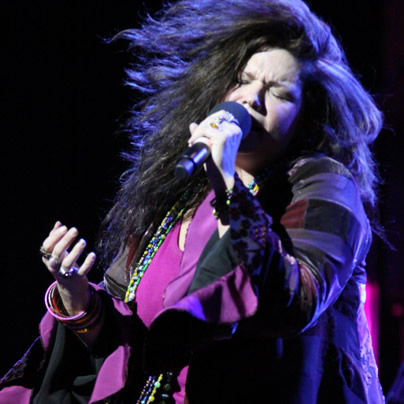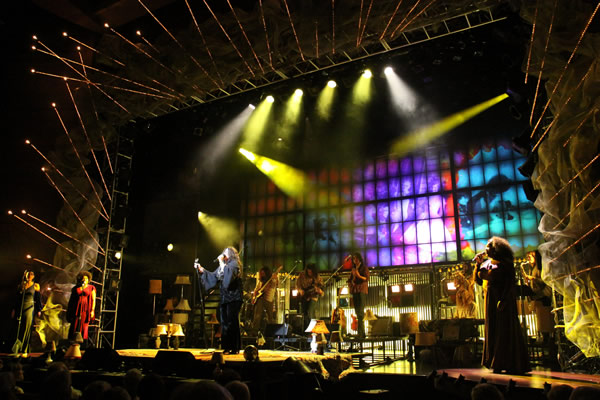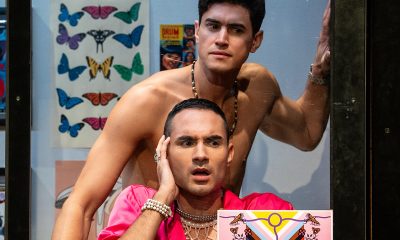Arts & Entertainment
‘Live as you are’
Joplin bio-musical recreates rock legend concert experience

‘One Night With Janis Joplin’
Arena Stage
1101 6th Street, SW
Through Nov. 4
Tickets: $45-$94

Mary Bridget Davis as Janis Joplin in the Arena Stage production of ‘One Night with Janis Joplin.’ (photo by Janet Macoska; courtesy Arena)
Classic rock fans love pondering what might have become of the greats had they lived. If you really know the history and their personalities, informed prognosticating on what might have been likely makes for great barstool conversation.
For Janis Joplin, it’s hard to say. With a woman so known for her give-it-everything — detractors called it histrionic — delivery, what kind of singer and performer would she have become had she not ODed in 1970?
Mary Bridget Davies has a few thoughts and having researched Joplin’s life for two different stage productions and fronted a rock band herself, she’s in a pretty good position to imagine.
“It’s really a shame she died when she did, not just because it’s sad she died of course, but I really do think she was onto something musically just then,” the 34-year-old Cleveland resident says. “When you think about what came along in music just after that with the Allman Brothers and that whole southern rock thing, it’s a shame she missed that whole movement because I really think she could have been the mama of that. You hear some of that on ‘Pearl,’ like with ‘Bobby McGee.’ I definitely think she would have stayed in music as long as she could because it absolutely was her passion.”
Davies reprises her role as Joplin in “One Night With Janis Joplin” which had a successful summer run in Cleveland and is at Arena Stage in Washington through Nov. 4.
During a lengthy phone chat last week, Davies says several scenarios for what might have been Joplin’s fate in a parallel universe are feasible — the legendary singer might have blown out her voice irreparably in time, gone more heavily into the blues she loved, mellowed out some vocally to pace herself or become a southern rock headliner. Part of the mystique, of course, is that we’ll never know.
The “One Night” show — which its creators say is as much a concert as a play — doesn’t pretend to guess. Rather it recreates Joplin’s live concerts — in a way — while including her influences and thoughts.
Playwright Randy Johnson, who’s written successful shows on other late music icons such as Elvis Presley, Conway Twitty and Patsy Cline, says the show sidesteps the pratfall of possibly becoming a cheesy tribute band-type production because he had access to Joplin’s art, letters and diaries.
“Most of those types of shows are created more from a fan perspective as opposed to a true biographical perspective,” the gay, Los Angeles-based playwright says. “I’ve never done a show that didn’t have the support of the family. I wouldn’t do it. Because if you read a biography without the family’s input, what you’re really reading is an opinion.”
The two-hour show, which finds Davies and a live band tearing through 22 Joplin classics, is pared down from its original length. Johnson opened the show in Portland and found he could streamline the piece after seeing how audiences absorbed it. Any overlap in what was being said versus sung was cut.
Davies was an understudy for the Cleveland production at first, but eventually took over when actress Cat Stephani, who got good reviews as Janis in the Portland production, bowed out just before the Cleveland opening.
Davies says she thinks her predecessor “seemed really run down.” She understands to a point — reproducing Joplin’s no-holds-barred vocal fire eight shows a week could ruin almost anyone’s voice. Even Joplin herself didn’t do that — shows in the classic rock era weren’t the two-hour-or-more marathons they became later with acts like Bruce Springsteen. Neither was Joplin playing eight shows a week.
Davies says while donning the Joplin stage garb can yield a feeling of invincibility — “You step out in those beads and velvet pants and that little waist band thing might as well have guns in it. It’s like you’re totally the sheriff in these parts.” — she does have to pace herself. Being a singer herself, she travels and records with her own blues/rock eponymous outfit, helps. She also played Joplin in the show “Love Janis” in 2005 and tours sometimes with Joplin’s old band Big Brother and the Holding Company.
“I take very good care of myself from a health standpoint,” she says. “Sure, there’s a part of me that would love to go out after the show and have 10 drinks and smoke a pack of cigarettes, but you just can’t do that when you have to do it six more times that week.”
Johnson says he knew Davies would be great in the part.
“You really can’t approach this from a musical theater background,” he says. “You can’t just kind of wink at the audience and fake your way through it. Mary Bridget has Janice in her DNA. … The ones who came in (to audition) with the boas and so on usually don’t make it past 16 notes. She came in in a nice shirt and jeans, opened her mouth and just blew the whole table away.”
Oddly, Davies remembers Liza Minnelli being at the table during her audition.
“I think a lot of the girls buckled under her presence,” she says. “She and Randy are friends. She was sitting there, leaning in at the stage table, all smiles like the best stage mom you could ever ask for.”
For Johnson, who was approached by Joplin’s two siblings (who manage her estate) in 2009 about the possibility of doing a show, Joplin still has something to say even all these decades later.
While he fully acknowledges she had “demons,” he says the “drugs and craziness were only about 10 percent” of her life. When studying her writings, he discovered a “very gentle spirit with a great sense of humor who was not bullshitting anybody.”
A 1950s conformist hangover made it a lot tougher to do so in that era, he says.
“It wasn’t easy but she simply spoke and sung her own truth and audiences were drawn to that.”
Though the show doesn’t address Joplin’s bisexuality, Johnson says her story has a message for gays today.
“If you listen very carefully to the show, she’s telling you to be yourself,” he says. “Don’t bullshit yourself, don’t bullshit anybody else and live it while you can. You can lie but eventually it comes out, so I think her message is to simply live as you are.”
Television
ICYMI: ‘Overcompensating’ a surprisingly sweet queer treat
A sweet, savvy show about breaking free to embrace your true self

Pride month 2025 is now behind us, and while it’s safe to say that this year’s celebrations had a darker edge than usual, it’s also true that they came with a particularly rich bounty of new queer movies and shows to entertain us – so many, in fact, that even if we are facing a lull until the fall another harvest of fresh content, there are still plenty of titles – which, for whatever reason, were off your radar – for you to catch up on in the meantime.
One of the most notable of these – the bingeworthy series “Overcompensating” (now streaming on Amazon Prime) – will most definitely have been ON the radar for the plentiful fans of creator and star Benito Skinner, the actor/comedian who rose to viral fame through his content on platforms like Instagram, YouTube, and TikTok. For anyone else, it might have easily slipped through the cracks.
Created and written by Skinner as a loosely autobiographical “college comedy,” it aims for the kind of raucous, explicitly sexed-up tone one expects from the genre as it centers on Benny (Skinner), newly arrived as a freshman at prestigious Yates University. A former football jock and “golden boy” at his midwestern high school, he’s the picture of idealized youthful masculinity; he’s also deep in the closet, struggling to keep his sexuality hidden and maintain his macho front under the intense scrutiny of the college’s social scene – and under the resentful eye of his older sister Grace (Mary Beth Barone), who has already secured her own place at the top of the pecking order.
In the first episode, Benny’s difficulties are eased when he meets Carmen (Wally Baram), another freshman trying to navigate the politics of college life; a gamer from a home marred by tragedy, she’s an outsider who feels like she’s putting on an act, too, and they click – giving him the convenient “cover” of female companionship while providing them both with much-needed support and encouragement. He’s also befriended by a handsome film major from England (Rish Shah), who has already caught his eye, stirring other kinds of feelings and possibly even reciprocating them. Meanwhile, he’s being courted by the school’s “exclusive secret society” – headed by his sister’s aggressively “alpha” boyfriend Pete (Adam DiMarco) – and trying to stay interested in his studies, despite a growing realization that a career in business doesn’t actually appeal to him all that much.
That’s a lot to juggle for anybody, even an overachiever like Benny – whose “lucky” life so far has largely been the result of playing a role he is finding harder and harder to maintain. As the series goes on through its eight-episode arc, it becomes clear that he’s not the only one who is “keeping up appearances,” and he, along with the other confused and damaged young people in his orbit, begins the painful (but often hilarious) process of evolution that is required in order to become truly oneself.
Directed toward appealing to a younger demographic, “Overcompensating” is the kind of show that requires a few episodes worth of invested time to make an impression that feels like substance. Full of the bawdy farcical antics that go hand in hand with stories about hormonally charged college kids, it’s not above leaning into the formulas and tropes that have always driven these kinds of comedies. At first, while its broadly comedic strokes and frequently explicit sexual hijinks might elicit plenty of chuckles, the show might easily feel tiresome for more mature audiences; there’s a nostalgic fun to it, made even more appealing, somehow, by the “political incorrectness” of its frequently sexist and homophobic humor, but for a while things may feel like an unnecessary attempt to reinvent “Animal House” for the Gen Z crowd.
By the time the season reaches its halfway point, however, things have started to get real. The antics of these horny almost-adults take on a more pointed absurdity, informed by the increasingly tangled web of defensive deceit they weave among themselves – and, as things draw toward a cliffhanger climax, the consequences of maintaining it – until it achieves a sense of empathy toward them all. There’s a wisdom that smacks of lived authenticity underlying the whole affair, transforming it from the “sexploitative” teen comedy of its surface into something deeper. To be sure, things stay expectedly wacky, and the soap-operatic melodrama of its twists and reversals continue to maintain the show’s “mature YA” appeal; but beneath those trappings, by the end of the season a truer identity has begun to emerge, just as its characters have begun to find their own levels of self-actualization for themselves.
As creator, primary writer, and star, it’s obviously Skinner who deserves much of the credit. While it might be tempting, early on, to dismiss the show as an “ego project,” the internet-spawned sensation proves his talents quickly enough to get past such judgy suspicions, delivering a pitch-perfect blend of sauciness and sensitivity that extends its appeal toward both ends of the taste spectrum; just as crucially, he brings the same aforementioned “lived authenticity” to his winning performance – after all, he’s essentially playing himself in a fictionalized version of his own life – while also making sure that equal time (and compassion) is afforded all the other characters around him, each of whom are pushing at the boundaries of their own respective “closets,” too. It’s unavoidable to notice that – like most of his co-stars – he’s plainly a decade too old to be playing a college student; but by the time we reach that crucial halfway turning point, we’ve become too engaged by him to care.
The show is full of excellent performances, in fact. Relative newcomers Baram and Barone offer layers of complex nuance, while the more familiar DiMarco (“White Lotus”) is close to heartbreaking as the toxic BMOC clinging to the illusion of power as his life begins unraveling around him. Other standouts include the mononymic actress Holmes as Carmen’s “wild child” roommate, solidly likable turns as Benny’s parents from mature veterans Connie Britten and Kyle MacLachlan (whose presence, along with stylish elements in several key scenes, hints at an homage-ish nod to the late David Lynch), and podcaster Owen Thiele as an openly gay fellow student who has Benny “clocked” from the moment they meet. Finally, Lukas Gage makes a deep impression as a former high school teammate at the heart of Benny’s most haunting memory.
There’s no official word yet on whether “Overcompensating” will be renewed for a second season, despite the multiple loose ends left dangling at the end of its first; it has proven to be popular, and Skinner’s large fanbase makes it likely that the story will continue. Even if it doesn’t, the place of uncertainty in which it has left its characters rings true enough to serve as a satisfying endpoint.
As for us, we hope that won’t happen. For all its sophomoric humor, generic plot twists, and purposefully gratuitous sexual titillation, it’s one of the sweetest, kindest, and most savvy shows we’ve seen about breaking free from conformity to embrace your true self – and that’s a message that applies whether you’re queer, straight, or anywhere in between.
Photos
PHOTOS: Independence Day Weekend in Rehoboth
Wicked Green Pool Party, fireworks among festivities

Vacationers and residents alike enjoyed Independence Day Weekend activities in Rehoboth Beach, Del. The Wicked Green Pool Party drew hundreds to the CAMP Rehoboth fundraiser on Saturday. That evening, revelers went to the rooftops to watch the fireworks display.
(Washington Blade photos by Daniel Truitt)













Music & Concerts
Red, White, and Beyoncé: Queen Bey takes Cowboy Carter to D.C. for the Fourth of July
The legendary music icon performed on July 4 and 7 to a nearly sold-out Northwest Stadium.

Just in time for Independence Day, Beyoncé lit up Landover’s Commanders Field (formerly FedEx Field) with fireworks and fiery patriotism, bringing her deeply moving and genre-defying “Cowboy Carter” tour to the Washington, D.C. area.
The tour, which takes the global icon across nine cities in support of her chart-topping and Grammy-winning country album “Cowboy Carter,” landed in Prince George’s County, Maryland, over the Fourth of July weekend. From the moment Beyoncé stepped on stage, it was clear this was more than just a concert — it was a reclamation.
Drawing from classic Americana, sharp political commentary, and a reimagined vision of country music, the show served as a powerful reminder of how Black Americans — especially Black women — have long been overlooked in spaces they helped create. “Cowboy Carter” released in March 2024, is the second act in Beyoncé’s genre-traversing trilogy. With it, she became the first Black woman to win a Grammy for Best Country Album and also took home the coveted Album of the Year.
The record examines the Black American experience through the lens of country music, grappling with the tension between the mythology of the American Dream and the lived realities of those historically excluded from it. That theme comes alive in the show’s opening number, “American Requiem,” where Beyoncé sings:
“Said I wouldn’t saddle up, but
If that ain’t country, tell me, what is?
Plant my bare feet on solid ground for years
They don’t, don’t know how hard I had to fight for this
When I sing my song…”
Throughout the performance, Beyoncé incorporated arresting visuals: Black cowboys on horseback, vintage American iconography, and Fox News clips criticizing her genre shift — all woven together with voiceovers from country legends like Dolly Parton and Willie Nelson. The result was a multimedia masterclass in storytelling and subversion.
The “Cowboy Carter” tour has been a social media sensation for weeks, with fans scrambling for tickets, curating elaborate “cowboy couture” outfits, and tailgating under the summer sun. At Commanders Field, thousands waited in long lines for exclusive merch and even longer ones to enter the stadium — a pilgrimage that, for many, felt more like attending church than a concert.
One group out in full force for the concert was Black queer men — some rocking “denim on denim on denim on denim,” while others opted for more polished Cowboy Couture looks. The celebration of Black identity within Americana was ever-present, making the concert feel like the world’s biggest gay country-western club.
A standout moment of the night was the appearance of Beyoncé’s 13-year-old daughter, Blue Ivy Carter. Commanding the stage with poise and power, she matched the intensity and choreography of her mother and the professional dancers — a remarkable feat for someone her age and a clear sign that the Carter legacy continues to shine.
It’s been nearly two decades since Beyoncé and Destiny’s Child parted ways, and since then, she’s more than lived up to her title as the voice of a generation. With “Cowboy Carter,” she’s not just making music — she’s rewriting history and reclaiming the space Black artists have always deserved in the country canon.
-

 Federal Government2 days ago
Federal Government2 days agoTreasury Department has a gay secretary but LGBTQ staff are under siege
-

 Virginia3 days ago
Virginia3 days agoDefying trends, new LGBTQ center opens in rural Winchester, Va.
-

 District of Columbia2 days ago
District of Columbia2 days agoGay GOP group hosts Ernst, 3 House members — all of whom oppose Equality Act
-

 Opinions4 days ago
Opinions4 days agoUSAID’s demise: America’s global betrayal of trust with LGBTQ people













